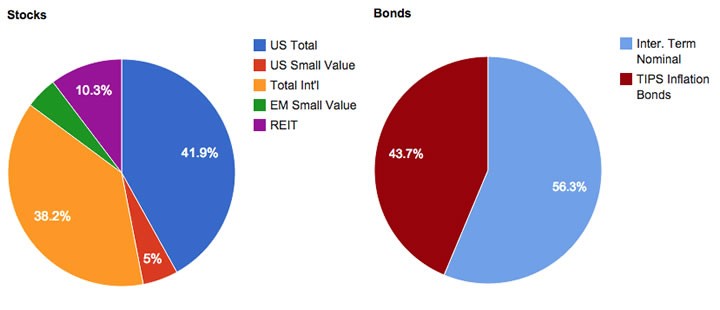Vanguard Total International Stock Index Fund Review (VGTSX VTIAX VXUS)
Post on: 22 Май, 2015 No Comment

(See also: Vanguard Total Stock Index Fund Review )
The Vanguard Total International Stock Index Fund is available both as a mutual fund (VGTSX, VTIAX) and an ETF (VXUS). Across all shares classes, there is currently around $90 billion dollars invested in this fund, making it one of the top 10 largest funds in the world. As the name suggests, this fund attempts to include all the investable companies from every single country in the world outside the US. From Indonesia to Morocco, from Luxembourg to Hong Kong. It also includes small-cap, mid-cap, and large-cap companies, unlike many other total international index funds. Such a wide coverage area makes this fund very fascinating. Lets take a look inside.
Market Capitalization Weighting
The Vanguard Total International Stock Index Fund is currently transitioning from tracking the MSCI ACWI ex USA IMI Index to the FTSE Global All Cap ex US Index (say that 5 times fast!). The two indexes are very similar; the change is primarily an attempt to avoid the higher licensing costs charged by MSCI. (The good news is that Vanguard has a great track record of passing on such savings onto their fund investors.) These are both market-cap weighted indexes, which means that the amount of each stock held is directly proportional to the total market value of the company (regardless of the country). The following are the countries included (note that FTSE has Korea as a developed market):
Developed Markets countries include: Australia, Austria, Belgium, Canada, Denmark, Finland, France, Germany, Greece, Hong Kong, Ireland, Israel, Italy, Japan, Netherlands, New Zealand, Norway, Portugal, Singapore, Spain, Sweden, Switzerland and the UK.
Emerging Markets countries include: Brazil, Chile, China, Colombia, Czech Republic, Egypt, Hungary, India, Indonesia, Korea, Malaysia, Mexico, Morocco, Peru, Philippines, Poland, Russia, South Africa, Taiwan, Thailand and Turkey.
Taken from the MSCI factsheet [pdf], below is how the market-cap weighting system ends up splitting things up by country. Japan, UK, Canada, Australia, and France are roughly half of the fund, with everyone else making up the other half. In terms of regions, its roughly 40% Developed Europe, 30% Developed Pacific, 20% Emerging Markets, and 10% North America.
Taken from the FTSE factsheet. here is current sector weighting of the index:
The MSCI index currently has 5,992 constituents. The largest company is worth over $230 Billion, the smallest is worth only $6 million, and the median is $610 million. Meanwhile, FTSE has 5,394 constituents ranging from $230 Billion (Nestle) to $15 million, with a median value of $814 million. While the two are very similar, it would appear that the FTSE index has slightly narrower coverage of smaller companies. However, Vanguard doesnt always follow the indexes down to the letter, as right now the fund has 6,176 holdings.
Owning the Haystack
As is the case with holding a Total US index fund, owning a piece of every single stock that is publicly-traded is a powerful thing. Back in 1997, Apple Inc. had a market cap of around $2 billion. Today, the market cap is over $400 billion. Thats 200 times larger, or a 20,000% return over just 16 years. Instead of trying identify ahead of time that little company that will be the next Apple, you may already own it. To paraphrase a well-known quote from Vanguard founder Jack Bogle :
Dont look for the needle in the haystack. Buy the entire haystack.

You may not make a 20,000% return, but you will own the result of whatever innovation comes in the future. A company in Finland make figure out clean nuclear energy, or a Singaporean company could invent a way to create cheap, clean water in remote locations. You never know.
Another benefit that results from all this is minimal trading and thus very little turnover. If a company rises (or drops) in value, then with market-cap weighting it should be a larger (or smaller) part of the portfolio and there is no need to buy or sell any shares. Since you own the whole haystack, you dont even have to worry about a company going from emerging to developed. This means the fund is very tax-efficient and distributes very little taxable capital gains. In a taxable account, this improves your after-tax returns and lets compounding do its thing.
Fund Management Expenses
Since 2/28/2013, the annual expense ratio of both the ETF (no minimum) and Admiral share classes ($10,000 minimum) of the Vanguard Total International Stock Index Fund is 0.16%. So for every $10,000 invested, Vanguard charges a total of $16 a year to manage this basket of stocks. There is no way an individual could replicate the underlying holding themselves for such a price. The Investor class shares have an expense ratio of 0.22%. Specifically, these fund expenses are taken out of the funds net asset value (NAV) a tiny bit each day (fractions of a penny per share).
Final Thoughts
By representing the entire world excluding the USA in a complete, efficient, and low-cost manner, the Vanguard Total International Stock Index Fund is a great core holding and a perfect complement to the Vanguard Total US Stock Index Fund. Held together, you then own a haystack of all the companies around the world that can be reasonably be invested in based on liquidity and availability. If you wanted to hold these two fund in market-cap weighting as well, currently that would be a 47/53 Non-US/US split. (I just do 50/50.)
Owning a competing index fund that also tracks a broad world-minus-USA international index using market-cap weighting with a low expense ratio will likely give you similar results. However, I give a slight preference to Vanguard due to (1) their at-cost client-ownership structure helps to ensure that costs will stay low, and (2) their experience and skill at indexing.
Disclosures: VGTSX/VTIAX/VXUS is a cornerstone of my portfolio. and I expect it to stay that way for the foreseeable future.














